This situation occurs all the time. It is clear that this causes parents concern and even anxiety. Although - especially not worth worrying. First, a child’s refusal to eat in kindergarten usually does not cause any serious consequences for the child’s well-being. Secondly, such a "children's rebellion" always has its own reasons, which parents need to have a clear idea of.
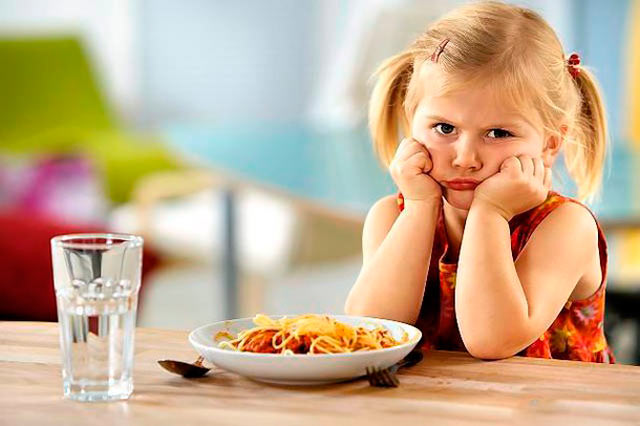
Psychological reasons why a child refuses food
Few people eat with pleasure in the first days of their stay in the kindergarten. First, he needs to get used to the new place and the strangers who surround him. In other words, adapt. Adaptation is one of the main reasons for a child’s refusal to eat. Parents should understand that a sharp change of scenery is always a stress for the baby. The main causes of childhood stress in this case are as follows:
- Early rise. At home, the child could wake up when he had a good night's sleep. In a kindergarten they wake him up forcibly and very early. It is clear that the children's body and psyche must adapt to a new regime for him. Until this happens, the baby will be capricious and refuse food;
- In kindergarten, there are many new toys that may be of interest to the baby. And until he “plays enough” with such toys, the child will most likely refuse food, believing that kindergarten breakfasts and dinners prevent him from playing;
- Too many peers. At home, the baby mostly talked only with parents, brother or sister, grandparents, or two or three peers in a sandbox in the yard. In kindergarten, the circle of his communication has expanded significantly. Now he is surrounded by many peers. In the first days of his stay in the kindergarten, the child will try to establish a relationship with them and, as they say, find his place in the team. This is a complex psychological process that requires a lot of strength, and therefore the baby can refuse to eat;
- Usually, especially in the first days of being in kindergarten, it seems to the child that his mother has left and will never return. At the same time, no assurances that the mother will necessarily take him in the evening do not affect the baby. This is how the children's psyche works. It is clear that in this state the baby simply can not eat, as it should;
- The child is used to listening only to his mother, and does not want to obey the teacher. For this reason, he may also refuse to eat in the kindergarten;
- Being at home, the baby was accustomed to the fact that before starting the reception, they always tell him a fairy tale, read a book or show a cartoon. For obvious reasons, no one in the kindergarten will specifically do this for him. As a result, a child, without waiting for a fairy tale or a beloved cartoon, may refuse to eat;
- Refusing to eat, the baby thereby tries to manipulate his parents. He is well aware that refusing food will make parents worry and anxious, and they will try to pick it up as soon as possible, or even not bring them to kindergarten at all. Such a manifestation childish selfishness far from the only one in this situation. Other egoistic manifestations may be the morning tantrums of the children, attempts to escape after the mother when she leaves the child in kindergarten, etc.
This is just the main and most general list of psychological reasons because of which the baby may refuse to eat. Since every child is a personality, each of the kids can have individual reasons for refusing. Parents must notify caregivers about the individual characteristics of the child’s character. As for educators, accordingly, they are obliged to take into account this important parental information, and try to take it into account when possible in the process of communicating with the child.
Other reasons your baby may be eating
In addition to psychological moments and nuances, children can remain hungry in kindergarten for other reasons. Here are just the most common of these reasons:
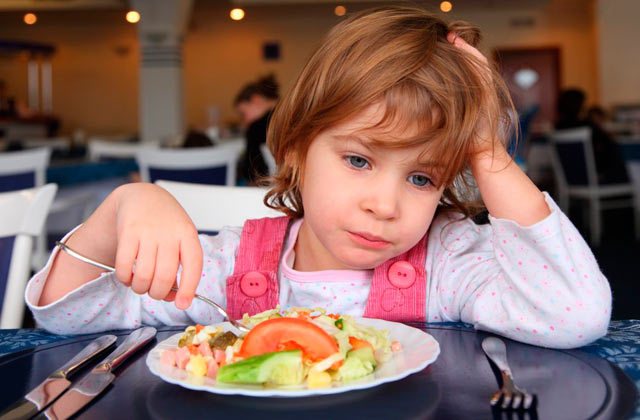
- The child is very selective in food, and he does not like kindergarten dishes. This also includes the fact that the child is simply afraid to try food that is not familiar to him. If the baby is 2-3 years old, then, due to age, he still has not had time to form any preferences in food. In this case, after a few days, he will get used to new dishes for him. If the child first entered the kindergarten at the age of 4-5, then it will be longer and harder to get used to unfamiliar food;
- Refusing to eat, the child thus protests. Such a children's “rebellion” usually happens in several cases: the baby has recently entered kindergarten, the teacher has changed, whom he has got used to, he was transferred to another group, he was not allowed to play with his favorite toy, etc .;
- The baby is from food, because he feels bad: he has a cold, a stomach ache, tooth loose etc.;
- A child has a congenital allergy to certain products. Parents must warn teachers about this before giving the baby to kindergarten;
- The kid eats little because of his innate features, and therefore is not able to eat everything that he is offered in kindergarten. This is especially true for children who have small stature and weight, as well as a calm character;
- Being at home, the child is accustomed to a different diet than in the kindergarten. In other words, in kindergarten he doesn’t want to eat when he is offered, and he wants when it is impossible. This also includes the fact that at home the baby is not fed according to the schedule, but when he asks or when it is more convenient for parents;
- The child does not know how to eat with his own spoon. Before identifying a baby in kindergarten, parents must teach him how to use a spoon and other cutlery. If for some reason this was not done, then almost certainly the baby will starve in the kindergarten. It may happen that the teacher, busy with other children, simply does not pay attention to the unlucky kid in order to feed him;
- The child is fed before being taken to kindergarten. It is clear that in this case, the baby is unlikely to eat kindergarten dishes. In the same way, he won’t eat when his parents fill his pockets with cookies and sweets “for a snack”;
- A child eats badly because it is affected by the time of year. It is known that in summer children grow faster than in winter, and therefore they eat in summer with great appetite, since they need more energy for growth;
- The baby is overly prone to natural biorhythms. Exposure to natural biorhythms is a feature of many people, both adults and children. For this reason, some people (including children) may not experience hunger in the morning or in the evening, or - at this time, eat only some specific food, and not everything that they are offered;
- The child may not be hungry due to its calm nature and, as a result, low physical activity;
- The process associated with food causes unpleasant associations in the baby. This can be in cases where he is often scolded at home for not being able to behave at the table, eating poorly, dropping food on the table or on the floor, etc. In this case, the child will also latently expect strict comments and reproaches, and, accordingly, eat little;
- A baby can eat poorly due to injustice and curiosity. Fidget children cannot sit at the table for a long time, they are often distracted, naughty, as they say, look at other people's plates. Because of this, they often remain hungry, not only themselves, but also prevent others from eating;
- It may happen that someone who doesn’t eat up kindergarten food elementarily. The reasons here may be different: non-nutritious or poorly prepared food, small portions, etc .;
[sc name = ”rsa”]
Again, it should be noted once again that this is far from all the reasons why children can refuse to eat in the kindergarten. A lot depends on the psychology, nature and physical characteristics of each individual baby.
We also read: Memo to parents: 20 reasons why a child does not eat in kindergarten, and what to do about it (part 1)
What to do for the baby to eat
Generally speaking, the answer to this question is obvious. So that the child does not refuse food in the kindergarten, it is necessary to identify and eliminate the reasons for which he does not want (or cannot) eat. The reasons have already been said. Let's talk about how they can be eliminated:
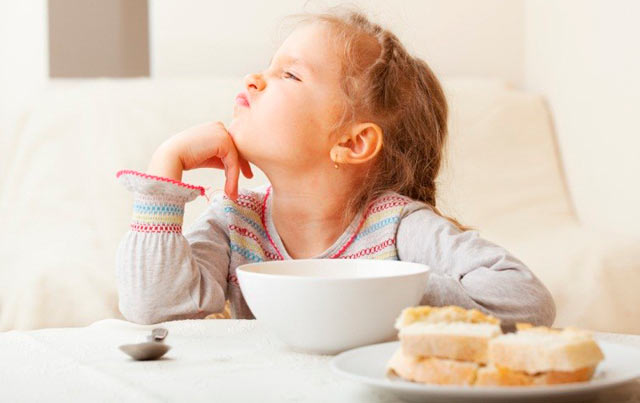
- Before you send your child to kindergarten, you need to teach him to use a spoon and other items that are used at the table. The child, taught to use cutlery, psychologically feels much more confident, and therefore he will be more willing to eat. We read about how to teach a child to use a spoon;
- It is necessary to try so that at home the baby has about the same daily regimen as in the garden. In other words, it is necessary to feed and put the baby to bed at the same time as in the kindergarten. Having adapted to the same regimen, the child will become in the habit of having breakfast, lunch and dinner at the same time, as a result of which he will be more willing to eat in the kindergarten;
- Variety should be added to the home children's menu, trying to make some dishes look like those that are fed to the baby in kindergarten. Accustomed to a variety of dishes, the child will cease to be afraid of unfamiliar food, and as a result will begin to eat not only at home;
- Every effort should be made so that breakfast, lunch, afternoon tea and dinner evoke pleasant associations in the kid. In no case should one rush a child with food and, moreover, criticize him for awkwardness and inability. On the contrary, every child’s success must be praised. This will develop confidence in the child that he is doing everything right. It has long been known that a self-confident person eats much more and more willingly than an insecure, intimidated and notorious. However, in this case, it is necessary to observe the measure in the sense that it does not turn the food process into an entertaining attraction, otherwise the child may take it for granted and will not want to eat without entertainment in the future;
- If the baby “rebels” (refuses to eat) in order to pity his parents so that they do not take him to the kindergarten, then in this case, convince him that the kindergarten is his job (as is the case with mom and dad);
- Respectful attitude to another's work is another way to convince the baby that he must eat. The crumbs should be explained that the aunt cook was preparing food for him, and if he refused to eat, he would offend her.It is very useful to show your child how this or that dish is prepared from time to time;
- No need to feed the baby before sending him to kindergarten;
- When the child is in the kindergarten, it is useful to sit him at the table with those children who do not refuse to eat. The kid will take an example from them, and as a result, very soon he will learn to eat just like other children;
- You should not take your baby home earlier so that he has lunch or dinner at home. Let him get used to eating in the team, taking an example from those peers who eat well;
- If the child did not want to eat in the kindergarten, then do not dwell on this and do tragedy, scolding the baby. It is better to pretend that nothing terrible has happened. Until the baby gets used to eating in kindergarten, it is useful to talk with him about what they were fed today and what they liked from food;
- If the baby is not fed up with kindergarten food, then in this case it is necessary to feed him breakfast before taking him to kindergarten, and also feed him after the kindergarten. You should also talk with the manager and the cook about how to replace some dishes with others. At present, in many kindergartens, parents are allowed to bring home, extra food to the kindergarten;
- In the case of children's “rebellion” (refusal to eat), the child needs to pay as much attention as possible, ask him all sorts of questions about how things are in the kindergarten, listen carefully to his answers, trying to determine in this way why the baby refuses to food. If the situation seems serious to you, it would be wise to consult a child psychologist.
- If it turns out that the baby, due to its psychological characteristics, cannot get used to the kindergarten environment, you should think about picking it up from the kindergarten and taking it back only after a year and a half. Or - hire your child a private nanny;
How to help your child adapt
In order for the baby to start eating normally in kindergarten, he needs to get used to a new environment for him. In other words, adapt. Of course, a lot depends on the baby himself, his psychology, state of health, etc. But, at the same time, there are quite a few general rules, considering which parents will help their child go through the adaptation period faster and more painlessly.
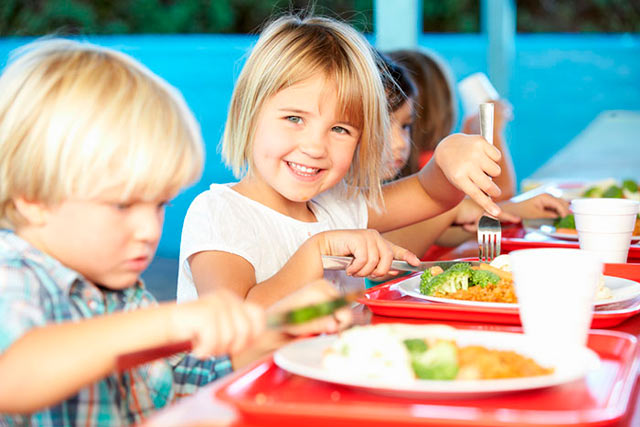
- Firstly: it is necessary to prepare the baby in advance for the kindergarten. In this case, it is not so much material preparation (buying new clothes, strollers, on which the baby will be taken to kindergarten, etc.), but moral help to the baby. The child must be explained in advance that changes will soon take place in his life, that is, he will go to kindergarten. At the same time, the baby must be persuaded in every way that no one will leave him there for a long time and will surely take him home, that there will be many interesting toys, new friends, etc. Believing you, the child will be more willing to go to kindergarten, and will get used to it much faster a new environment for him and new people.
- Secondly, the parents themselves also need to get used to the fact that their baby will be far away from them for some time. For this, parents also need to prepare in advance. In addition, parents, before giving their baby to kindergarten, need to get to know the tutors, director, cook and other people who work in the kindergarten as close as possible. And if it happens that one of these people does not like the parents for some reason, then it would be better to look for another kindergarten. Why is this so? It’s clear: the nervousness that mom and dad will experience every day, passing their baby into the hands of people they don’t trust, will be passed on to the child, and then it will be much more difficult to adapt.
- Thirdly, the adaptation itself. First, the baby should not be left in the kindergarten for the whole day, but only for a few hours. Then - an hour or two more. Then, depending on how the child feels, you can leave it for the whole day. There are no specific terms here: a lot depends on the baby.If conditions allow, then in the first days, mom can stay in the kindergarten with the baby.
When giving a child to kindergarten, parents need to be patient. In no case should you put pressure on the baby and try to speed up the process of adaptation. Usually, children, depending on the nature of the character, get used to kindergarten, starting from a period of two to three weeks and ending with a month or two. It is very important that during the period of adaptation of the house there is a benevolent and calm atmosphere. In this case, the baby, having accumulated new experiences for him during the day, will be able to relax at home, which will help him get used to the new environment for him.
We also read: Adaptation of the child to kindergarten: what parents need to know
If the child does not like kindergarten food
Cocoa with froth is disgusting, semolina seems like glue, and the mere smell of stewed cabbage provokes nausea. In this situation, not only other children, but also adults will understand the baby, because many people hate food from public catering. Try to teach a child to this food - on weekends, when he is at home, prepare a menu close to Sadovsky, and this:
- Milk porridge: herculean, buckwheat, millet.
- Soups: potato with cereal, milk with cereal or noodles, potato with meatballs, bean soup, borsch.
- Second: cutlets, stewed fish, roast, pilaf, hodgepodge.
- Garnish: stewed cabbage, mashed potatoes, vegetable caviar, pasta, cereals.
- Dinner: casseroles, stewed vegetables (beets, pumpkin).
- Drinks: tea, compote, cocoa with milk, lemon drink, kefir, chicory.
Of course, not a single child will be able to fall in love with all of the above dishes. It’s okay if he refuses pea soup, but eats cutlet and mashed potatoes with pleasure.
We also read:
- Mistakes of parents, because of which the child does not want to go to kindergarten
- What a child should be able to do in front of a kindergarten - 4 useful skills
- 7 skills that a child must learn before kindergarten
Alena Popova: Adaptation to kindergarten - 4 mistakes of parents. How to prepare a child


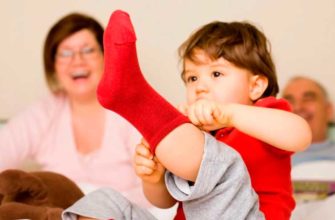






It seems to me that any child will not eat only for two reasons: either he is not hungry or he does not like food. And here it is important to know that the child is also suitable for taste - then the appetite comes at the sight of your favorite food.